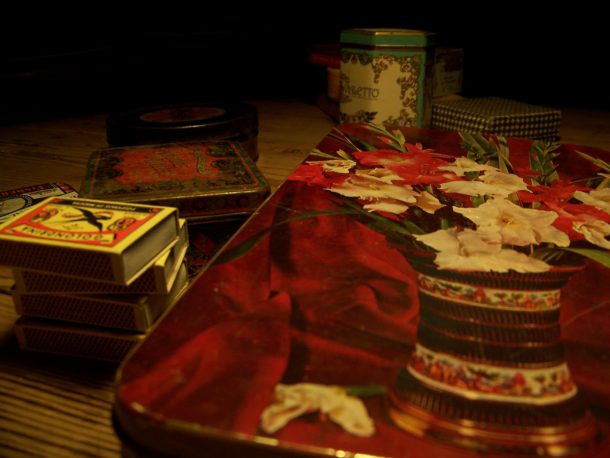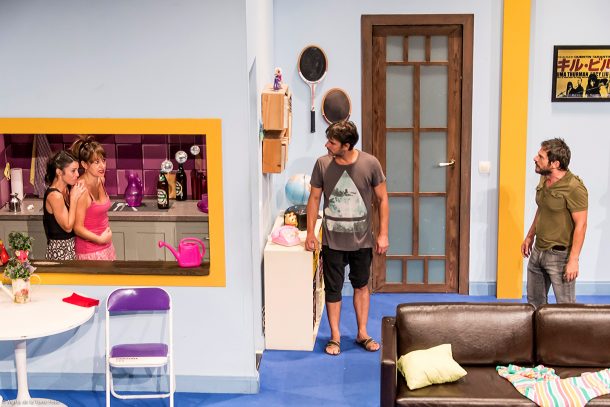Jordi Galceran has proved to be one of Spain’s most commercially successful twenty-first century dramatists. His runaway hit, El método Gronholm (The Gronholm Method) by Sergi Belbel, was first staged at the Catalan National Theatre in 2003 in a pacey, disarming production (see Western European Stages, 17.1, Winter 2005, pp. 5–6); it played for over three years with an extended run at Barcelona’s Poliorama Theatre and a second Spanish-language production in Madrid directed by Tamzin Townsend (see WES, 17.3, Fall 2005, pp. 122–23). By the time the play returned to Barcelona in 2010 it had played in thirty-five different countries and been seen by over 2 million people. Recent information suggests the play has now been staged in over fifty countries; its treatment of corporate buy and sell culture refracted through the prism of a dog-eat-dog job interview clearly resonates across both the global north and south. The film version, directed by Argentina’s Marcelo Piñeyro in 2005, further consolidated Galceran’s reputation in the Spanish-speaking world and led to a number of revivals of earlier works, including a timely staging of Fuga in 2011 (again directed by Tamzin Townsend), which played during the eruption of a number of high-profile political corruption scandals (see WES, 23.2, Spring 2011, p. 8).
In 2015, I reported on El crèdit (The Credit) at Barcelona theatre La Villarroel, admiring the play’s sharp dissection of the effects of Spain’s ongoing economic crisis on an Everyman figure trying to get a loan at his local bank. Galceran’s farce was enjoying a return run at the theatre where it had opened in September 2013 with Sergi Belbel’s dizzying production: a veritable medley of deceptions, misunderstandings, situational humor, and improbabilities. While I wasn’t able to see Jordi Casanovas’ production of the earlier Burundanga at the Villarroel in 2012, the Madrid staging by Gabriel Olivares, which opened at the Teatro Maravillas in July 2011, can still be seen, now at the Lara Theatre where it has been playing to sold-out houses since 2012.
The work is timely for a series of reasons. On one level it appears to be a frothy romantic comedy about a couple whose relationship is tested when one of them brings a new friend home for drinks. Architecture student Berta lives with chemist-in-training Silvia but has been seeing her boyfriend Manel for a while. When Berta discovers she’s pregnant she feels she needs to know if Manel really loves her and so she takes Silvia’s advice to drug her boyfriend with the truth drug burundanga. But she gets more than she bargained for when Manel admits both that he loves her and that he’s a member of ETA (Euskadi Ta Askatasuna, an armed Basque nationalist and separatist organization). Indeed, the Basque friend he’s planning to bring round for drinks, Gorka, is a fellow member of the same cell and together they are plotting a kidnapping to raise funds for the organization.
Silvia is keen to report Manel but Berta wants her to hold off for twenty-four hours to see if she can persuade him to repent and change his ways. What Silvia and Berta don’t yet know is that the men are planning the high-profile kidnapping of a wealthy businessman and that they are planning to hold the victim in Silvia and Berta’s flat while the women fulfill a longstanding plan to spend the day at the spa. While Miriam Cabeza’s Silvia flounces in and out of the flat and Elena de Frutos’ Berta gets ever more agitated, it is left to the kidnap victim, Jaime (Carlos Heredia), who turns out to be Silvia’s uncle—one of many improbabilities that Galceran juggles in the piece—to bring a degree of pragmatism to the proceedings. A social activist in a revolutionary organization of the 70s, he relishes the chance to advise the two hapless men on underground tactics. Manel and Gorka are terribly ill prepared for the task of kidnapping and holding Jaime. They can’t tie a knot or undertake basic self-defense, have no real sense of security, and struggle with surveillance. Jorge Monje’s Manel needs to be told what to do while Paco Mora’s Gorka proves to have a greater enthusiasm and aptitude for cookery than for guerrilla warfare.
Indeed, Gorka and Manel appear to have stepped in from Alexander MacKendrick’s Ealing comedy The Ladykillers (1955). Miriam Cabeza’s blonde Silvia has a Farrah Fawcett haircut and swings in and out of the flat with a dizzying sense of purpose. She thrusts the burundanga into Berta’s hands with gusto, and then adopts the same defiant resolution when trying to rid the apartment of the two men. De Frutos’ Berta is awash with hormonal changes and varied mood swings; scared and exhilarated, horrified and reassured, she doesn’t know where to turn; she jives around the stage weaving in and out of the furniture as she tries to decipher what her future might be and how to stop Silvia from calling the police to arrest the father of her unborn baby.
There is something of the “bad taste” drama in Galceran’s play, with the playwright evoking Lubitsch’s To Be or Not to Be as a model for the tone he’d hoped to achieve. There is also, however, something of Martin McDonagh’s The Lieutenant of Inishmore in the play’s ominously black humor. Galceran had spoken to ETA sympathizers when undertaking research for the piece and the two men appear as bumbling enthusiasts in the vein of Sean O’Casey’s vain, vacuous wannabe freedom fighters who are woefully ignorant of the realities of combat. The machinations also recall the comedies of comic dramatist Alfonso Paso and there is much of Jardiel Poncela’s wacky plotting in Galceran’s domestic setup. Marc Camoletti’s Boeing-Boeing is another tangible referent and the spirit of Almodóvar’s Women on the Verge of a Nervous Breakdown also has a presence in the misadventures of those who enter the apartment.
Anna Tusell provides a bright, pop-influenced Almodóvaresque set. Baby blue walls suggest something of a space of regression and playfulness. Bold yellow woodwork jumps out to help demarcate the different areas. The walls are adorned with tennis rackets, vinyl records and pop culture posters; the purple-tiled kitchen has colorful glassware and plants. A pink watering can coordinates with pink wellington boots and a baby pink telephone. White table and chairs and a funky coffee table on wheels rest on the bright blue carpet. A brown leather sofa serves as the spot for confessions and cuddling, for revelations and respites. Entries and exits come courtesy of the front door and the second door leading on to the corridor with the bedrooms. These comings and goings give the action a veritable sense of farcical buzz and comical frenzy.
Galceran provides quick, droll dialogue; Silvia in particular has a speedy answer for everything. Phone conversations with Jaime’s wife add a further layer of misunderstandings to the proceedings. In addition, visual gags flow freely: the women panic when Manel brings out a bottle which they mistake for a gun; Silvia drinks in desperation out of the watering can; and moves to seduce Gorka into drinking the beer Silvia has plied with burundanga in the hope of finding out exactly how far the two men are prepared to go prove laughable. Gorka in turn fans himself desperately with Silvia’s fan as he proves unable to cope with the rising pressure. There are antics in the kitchen as the five of them try to put a meal together from the paltry ingredients in Silvia’s fridge and panic as Manel tries to hurriedly get rid of Jaime’s mobile phone when Jaime draws attention to the fact that this could lead the police to the apartment. Cases of mistaken identity include Jaime’s wife confusing Silvia with an elderly aunt—but this supposedly dutiful wife also refuses to call the police when the ransom demands come in, suggesting that all is not well in the marital home.
Indeed, this is a drama about the undercurrents and the fault lines of Spanish society. Gorka is unemployed and his comments suggest that he may have turned to ETA for diversion and a purpose in life when he was no longer able to earn his living as a cook. He folds under pressure, breaking down when Jaime shouts at him. Gorka has a fair bit of bravado but little substance. Manel also points to a generation that has lost its bearings and seeks a sense of purpose wherever it can find it. Jaime was once a rampant revolutionary working to dislodge the Franco regime but is now a pillar of the establishment with offshore investments across the globe. The generation that got rich in the democratic era has little commitment to the egalitarian ideals they fought for under Franco. These so-called idealists may even be responsible for the wave of corruption scandals plaguing Spanish society. (The play deftly injects a number of references to present-day Spain: to bullfighters, austerity, and institutional fraud.) Manel and Gorka also have egalitarian ideals, but with no way of channeling them officially, they turn to the opportunities (and perceived thrills) that running an underground cell for ETA offers. In many ways they don’t really understand what they are fighting for or what it means to run a terrorist cell. This is a play about the generation Spain’s democracy has failed and the challenges presented in moving forward in an age of austerity. Jaime’s offer to the men is the possibility of employment in Honduras—perhaps only by leaving Spain can they hope to find a future for themselves, and it’s a future that may not be entirely legal or desirable.
I saw Burundanga with a packed house on a hot Madrid evening. There were some issues with Miriam Cabeza’s projection in the opening moments but these appeared to settle down and the cast performed with energy and verve. The production feels like an out-and-out roller coaster ride. De Frutos captures the up-and-down nature of the pregnant Berta, Cabeza gives the bubbly Silvia a steely quality, and while Jorge Monje’s Manel and Paco Mora’s Gorka tend towards the blundering rather than the menacing, Carlos Heredia is able to imbue Jaime with an arrogance that leaves a nasty taste in the mouth.
While Burundanga plays to hundreds for each performance and depends in part on the dynamic of a full house, Xavier Bobés’ Cosas que se olvidan fácilmente (Things Easily Forgotten) relies on a level of intimacy which can only be achieved by an audience of five. The audience is led to a performance space—I saw it at the remarkable BE FESTIVAL (Birmingham European Festival) where it played in the old, musty safe of the Brasshouse building—where the rules of the game are laid out. The five audience members-cum-actors are seated around a small round table. Through the darkness, Bobés, who guides the show like a magician-cum-Master of Ceremonies, conjures images. Operating a small table lamp, he produces objects that he illuminates: pages from a calendar take us back in time; photographs show a family through the hard years of the Franco regime; ration books evoke the realities of survival in the post-Civil War years of austerity. The keyrings he produces signal key events (the Football World Cup of 1982, the 1992 Olympics), and the covers of ¡Hola! magazines show how history was represented and de-historicized in the name of celebrity entertainment. This is a poetry of objects, of things easily forgotten that tell of human lives affected by conditions of war and the realities of life under a dictatorship. Scratched records play songs that evoke a bygone era, postcards reveal hopes and dreams, tins that once held biscuits are opened to reveal black and white photographs that summon a lost world, a deck of cards shuffled before us points to the passing of time and to the element of chance that governs all aspects of our lives. The velocity with which Bobés flashes the images and objects before the tiny audience offers an insight into performance itself: a world which disappears before our eyes, forgotten before it can be properly remembered.

Objects come to life in Xavier Bobés’s Things Easily Forgotten. Photo: courtesy of the author.
Bobés is part magician, part actor, part visual artist, part puppeteer. He works with the material of the everyday—with objects that are too often discarded—and creates a poetics of the imagination that reminds us of our past and of the ways in which it is fabricated from associations, recollections and ephemera. In his hands a photo comes to life, a keyring becomes a link to an event of the past, a postcard conjures a world in the distance. Things Easily Forgotten is a work of great dexterity and delicacy in which the audience shares moments of intimacy as a family world is summoned from everyday stuff; I left the performance longing to see it again, to share the memories of the intangible lives that these objects evoke. Catch it while you can. Things Easily Forgotten can be seen at Berlin’s Schaubude during the Theater der Dinge (Theatre of Things) festival from 29 October to 1 November 2016, and then at the Teatre Auditori de Granollers (8–11, 15–18 December), at Sant Cugat’s Biblioteca de Mira-sol Marta Pessarrodona (27–30 December), and at the Catalan National Theatre (from 11 January to 26 February 2017).
Maria M. Delgado is Professor and Director of Research at Royal Central School of Speech and Drama, University of London, and Honorary Fellow of the Institute for Modern Language Research at the University of London. Her books include “Other” Spanish Theatres: Erasure and Inscription on the Twentieth Century Spanish Stage (MUP, 2003) and Federico García Lorca (Routledge, 2008), and the co-edited Contemporary European Theatre Directors (Routledge, 2010) and A History of Theatre in Spain (Cambridge University Press, 2012). She has published two collections of translations for Methuen and is co-editor of Contemporary Theatre Review.
European Stages, vol. 8, no. 1 (Fall 2016)
Editorial Board:
Marvin Carlson, Senior Editor, Founder
Krystyna Illakowicz, Co-Editor
Dominika Laster, Co-Editor
Kalina Stefanova, Co-Editor
Editorial Staff:
Cory Tamler, Managing Editor
Mayurakshi Sen, Editorial Assistant
Advisory Board:
Joshua Abrams
Christopher Balme
Maria Delgado
Allen Kuharsky
Bryce Lease
Jennifer Parker-Starbuck
Magda Romańska
Laurence Senelick
Daniele Vianello
Phyllis Zatlin
Table of Contents:
- The 70th Avignon Festival: An Experiment In Living Together by Philippa Wehle
- The 2016 Berlin Theatertreffen: Is Half a Festival Better Than None? by Marvin Carlson
- Introduction au Kunstenfestivaldesarts de Bruxelles 2016 by Manuel García Martínez
- The Fidena Festival, 2016 by Roy Kift
- The Noorderzon Festival in Groningen by Manuel García Martínez
- Review of The Suicide by Steve Earnest
- Spain: Runaway Hits and Ephemeral Memorabilia by Maria M. Delgado
- The Seagull: An Idea for a Short Story by Emiliia Dementsova
- Billy Elliot The Musical at the Hungarian State Opera by James Wilson
- Chorus of Orphans: A Theatre Séance by Poland’s Teatr KTO, Kraków by Jacob Juntunen
- Theatre More Arresting than Ever: A Conversation with Dorota Masłowska by Krystyna Lipinska Illakowicz
Martin E. Segal Theatre Center:
Frank Hentschker, Executive Director
Marvin Carlson, Director of Publications
Rebecca Sheahan, Managing Director
©2016 by Martin E. Segal Theatre Center
The Graduate Center CUNY Graduate Center
365 Fifth Avenue
New York NY 10016




